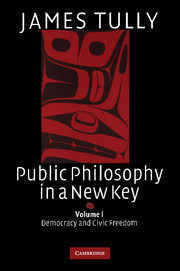Public philosophy and civic freedom: a guide to the two volumes
Published online by Cambridge University Press: 05 September 2012
Summary
Public Philosophy in a New Key is a new approach to the study of politics. The role of a public philosophy is to address public affairs. This civic task can be done in many different ways. The type of public philosophy I practise carries on this task by trying to enter into the dialogues with citizens engaged in struggles against various forms of injustice and oppression. The aim is to establish pedagogical relationships of reciprocal elucidation between academic research and the civic activities of fellow citizens. The specific role of this public philosophy is to throw a critical light on the field of practices in which civic struggles take place and the practices of civic freedom available to change them. It does this by means of historical and critical studies of the field and the given theoretical forms of representation of it. Reciprocally, this critical ethos learns from citizens and the successes and failures of their civic activities how to improve the historical and critical studies and begin again.
In the studies that follow, I use the term ‘citizen’ to refer to a person who is subject to a relationship of governance (that is to say, governed) and, simultaneously and primarily, is an active agent in the field of a governance relationship. While this includes the official sense of ‘citizen’ as a recognised member of a state, it is obviously broader and deeper, and more appropriate and effective for that reason.
- Type
- Chapter
- Information
- Public Philosophy in a New Key , pp. 3 - 12Publisher: Cambridge University PressPrint publication year: 2008

